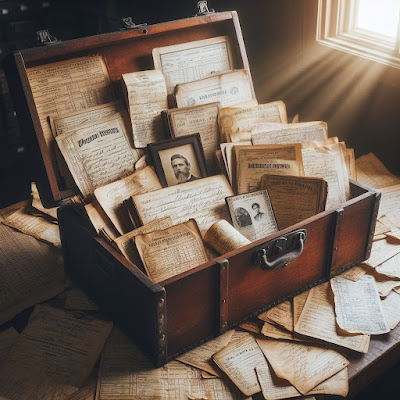Shedding Your Genealogy "Stuff"
 |
| AI: Bing Image Creator Generated |
Changing realities force many of us to consider the future of our genealogical collections. Whether a change in health, a new location or even just downsizing, it can be useful to evaluate what we have now, with an eye to the future. What we can pass along?
Plan Ahead
First: if you have online trees, create a plan to grant access to interested fellow researchers, even distant cousins. Depending on the website, you may need to add a codicil to your will, or just tell the site whom your successor will be.
FamilySearch help file: How to Connect to a Family Member’s Tree. Because it is a shared tree, a person cannot pass along their FamilySearch account. Ensure that your interested family members know how to create and login to FamilySearch to continue the family history work!
The same is true for Wikitree; be sure to assign interested people to the Trusted List and/or as Managers to profiles as you work.
FamilyTreeDNA has a wonderful feature: test takers can choose a beneficiary AND a kit manager.
 |
| FamilyTreeDNA Account Settings: Beneficiary choices |
It is important to set all the account settings, but choosing a manager and beneficiary are critical to your test results continuing to help other researchers. Be sure to join appropriate projects and give the administrators all the permissions they need to use your data to help others.
Offline "Stuff"
What is the state of your research? Do you have books, manuscripts, computer files, paper records, or heirlooms? In general, there are groups accepting some of those as donations. Consider each group separately, because perhaps family members want some of what you have, but not the rest. Have you authored the books, and on what topics? Published family histories are accepted by many repositories, and you want to send them where researchers can find them.
 |
| Screenshot from the Library Homepage |
The FamilySearch Library accepts donations of some books, particularly those published in electronic form. See https://www.familysearch.org/en/library/donations for more. Because they are the largest genealogical library in the world, contact FSL first if you have books to donate.
 |
| Allen County Genealogy Center |
Allen County Genealogy Center, https://www.genealogy.acpl.lib.in.us/ also takes donations, and may accept files of genealogical material. Email: Genealogy@ACPL.Info or call them: 260-421-1225, tell them precisely what you have, and see what they say.
 |
| Internet Archive: https://archive.org/ |
The the Internet Archive takes donated material: How Do I Make A Physical Donation To The Internet Archive? Note that they take far more than just paper; they also collect recordings, historical documents, and some other artifacts.
| ArchiveGrid |
You might find a local, religious, college, university or regional library, historical society or archive a better choice, depending on where your ancestors lived and worked. See ArchiveGrid: https://researchworks.oclc.org/archivegrid/ for the types of archives available; there are a huge variety.
If you plan on visiting an historical society, archive and/or library, and you have even a paragraph about the ancestor(s) you are there to research, be sure to not just sign their visitor log book and add your contact information, but also ask about their Vertical Files and ask to add to it. Plan this as part of your visit.
No Regrets
If you have online trees and you will have access to a computer at your next residence, you will still have everything in your tree. An online tree takes zero room in your house! The same is true of any photos and documents you have scanned.
Share login information with your family or other interested relatives so that your research is not lost. Some sites will honor codicils to your will, assigning online accounts to responsible family members. At the very least, with login credentials they can log in and create the transfer request.










Comments
Post a Comment